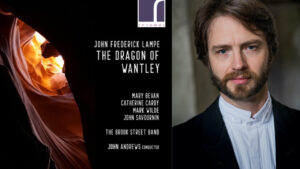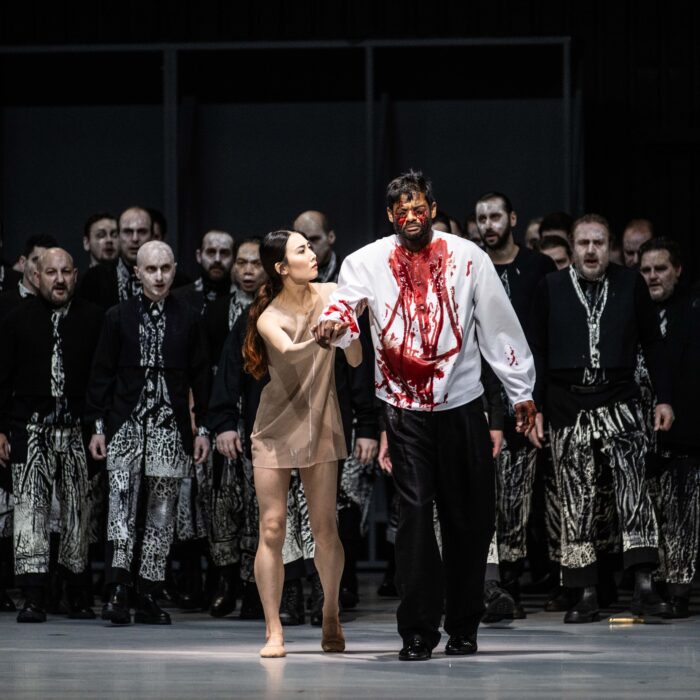
CD Review: Resonus’ ‘The Dragon of Wantley’
By Bob DieschburgA sensational success at London’s Haymarket Theatre (i.e. the Little Theatre in the Hay) and, later, at Covent Garden, John Frederick Lampe’s “The Dragon of Wantley” is a musical satire based on the comic ballad of Knight Moore of Moore Hall and his unlikely defeat of the title-giving serpent by nothing but “a kick on the arse.”
The tone, both in the ballad and the libretto, written by Henry Carey, is predictably coarse and in stark contrast to the prevailing decorum of Italian opera seria, as represented by Händel and, thematically, the Augustan tragedies then in vogue in London theaters.
The pastiche, if you will, even extends to the romantic subplot involving a love triangle between Moore, Margery, and the unfortunate Mauxalinda. Its vocabulary, again, is loaded with cliches and there is no doubt 18th century audiences would hardly suppress a smile when Moore – a Falstaffian avant la lettre – declares “Zeno, Plato, Aristotle / All (…) lovers of the Bottle. (…) All admire a pretty Lass / All require a cheerful Glass.”
A Resonus Rediscovery
Resonus, in their 2022 release, captures most of the comedic essence of “The Dragon of Wantley.” At the helm of the Brook Street Band, conductor John Andrews delivers a methodical and philologically informed rendition of Lampe’s score, lighthearted when needed and in constant support of the main cast among which Mary Bevan stands out as a thrilling Margery.
Together with Catherine Carby she especially shines in the Act two duet of the female protagonists (“Insulting Gypsy / You’re surely tipsy”), filled with vocal thrills and acrobatics emulating the famed Faustina-Cuzzoni rivalry from “The Beggars’ Opera” (1728).
As such, the coloraturas are finely executed, the timing is impeccable and the vocal timbres of Bevan and mezzo Carby appear not only matching but congenial in their ability to express a wide array of emotions ranging from the bittersweet (“Sure my Stays will burst with sobbing”) to sheer vexation (“I’d much rather beg on crutches”) and romantic elatedness.
The Dragon’s Melismatic Roar
Unlike the sea monster in Händel’s “Giustino” (1737), Lampe’s dragon is a rather talkative and crude adversary (“Oh ho! Master Moore, you Son of a Whore / I wish I had known your Tricks before.”) to whom John Savournin, doubling as Gaffer Gubbins, lends his hefty and very solemn bass-baritone.
The voice is firm yet malleable when entering the coloraturas on “Whore” and “before” in the dragon’s introductory aria. The latter is immediately followed by the so-called “Battle Piece,” an orchestral paraphrase of the Handelian idiom.
The part of Moore of Moore Hall is sung by Mark Wilde. The Scottish tenor phrases elegantly, the voice having a bright and very pleasant timbre that accords well with the cheerful writing of his da capo aria in act one (“Zeno, Plato, Aristotle”). On a technical level, his coloratura runs may not be as clean as Bevan’s but Wilde’s enthusiasm and, in the final duet, wonderful tenderness make up for whatever qualms the voice aficionados could justifiably raise.
“The Dragon of Wantley,” in short, is a marvelous rediscovery whose comedic elements as much as its melodic intuitiveness are at the forefront of the Resonus recording – without conductor John Andrews forfeiting his extreme care for accuracy, technical and metronomic, that is.
A world premiere on CD (as far as I can tell), it is not one listeners or, for that matter, scholars of English opera would want to miss.


